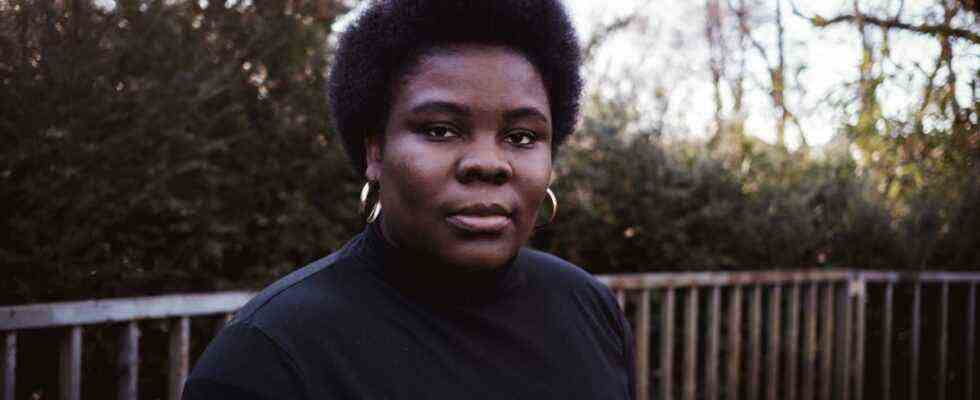As a white person, it is not often that you experience that something is not addressed to you. This book shakes the proportionality and dares an important change of perspective: Already the title “Black is capitalized” gives an indication of who is in focus here – for once, it is not the white majority society. “This book was written by us for us and is deliberately aimed at black people,” says Evein Obulor. Together with the team from RosaMag, an online magazine that addresses black “FLINTA” (women, lesbians, inter, non-binary, trans, agender), she published this remarkable volume at Munich Verlag & Töchter, which received a “publishing premium from Free State of Bavaria 2021 “was awarded.
Only 20 black FLINTAs have their say in the book, Obulor, who works as an anti-discrimination officer in Heidelberg, invited two of them to a zoom talk: The PR consultant and political activist Christelle Nkwendja-Ngnoubamdjum from Offenbach and the Aachen social worker and political activist Emiliene Wopana Mudimu . You exchange ideas about role models and your own creative work on the book, then both emphasize the great importance that “black is capitalized” for them. “I see the book as a total treasure, every time I read it, I discover a new aspect. It makes me whole and fragile at the same time,” says the Offenbacher.
The reading made her especially sensitive to the various power imbalances within the black communities, explains the Aachen social worker: “If there are certain realities of life that do not affect me because I simply have certain privileges, these are the points where I should take a closer look. to be a good ally. “
Christelle Nkwendja-Ngnoubamdjum is a political activist and works as a PR consultant in Offenbach.
(Photo: Katharina Dubno)
Self-reflection and questioning of current power structures is at least as necessary as a white person. Many black people who live in Germany often fail to find themselves and their own stories. The authors relentlessly intimate, painfully honest, and poetic and humorous about what their reality is like in this country, what problems they struggle with and what dreams they have for themselves and their descendants. In their texts they call for solidarity and community, take their place in their own search for identity, report on racist attacks and denounce structural discrimination such as hostility towards trans or fat. The collected contributions, framed by the wonderful collages by Sharonda Quainoo, are as different and diverse as the communities: from essays to field reports to poems and love letters, all genres are included.
The book is not an introduction to anti-racism, but rather for people who have already dealt with the topic
The editor and the two authors believe that white people could learn a lot from this book. The book is not an introduction to anti-racism, but is intended for people who have already dealt with the topic and are ready to learn and question. The volume is intended as a kind of compass that offers young black people topics and help for orientation and accompanies them in their confrontation with their blackness. The book “Bekennennen”, published by May Ayim, Katharina Oguntoye and Dagmar Schultz in 1986, was such a work for many Afro-German women today means and what conflicts it involves. This also includes dealing with the tendencies towards discrimination within black communities, which go hand in hand with the different degrees of black and white being. According to Obulor, who, as a mixed race and lightskinned woman, is only too aware of the aspect of privileges, has aimed specifically at a “darkskinned and queer majority” among the authors.
In a letter to her inner self, she thinks about what experiences she would like to pass on to her future kids who were born in the Congo
The topics all emerged from an intensive discussion with the authors. “For me, the letter is a form that gives a lot of space for self-reflection. Where do I stand with negotiating my black identity, where do I stand in relation to the communities and what are my experiences,” says Emiliene Wopana Mudimu, who wrote a letter to her younger self for the book. In it she thinks about what she would like to give her future kids from their experiences as born in the Congo, which they will hopefully be spared.
Christelle Nkwendja-Ngnoubamdjum also confirms that communities are necessary and important, but that there is also a risk of discrimination in every room. She, too, has chosen the letter form for her concern and opens, among other things, spaces for self-reflection in her moving, very poetic love letter to her “black, fat, fat siblings”. “I don’t think there are safe spaces. I would like safer spaces to be more possible – but in order to create and maintain them, among other things, a constant and honest examination of our privileges in our respective realities of life is necessary,” says the activist . The editor and the two authors agree that the book also serves as a “black collective archive of knowledge”. Black knowledge is often dismissed as a subjective experience, which is also a form of racism. With this tape, that is definitely certain, black knowledge solidifies and inscribes itself in heads, hearts and history.
“Black is Capitalized” published by Evein Obulor in collaboration with RosaMag, Verlag & Töchter 2021, 240 pages, 22 euros
The SZ author has changed this text as an exception, contrary to the usual SZ regulation, due to the relevant topic.

